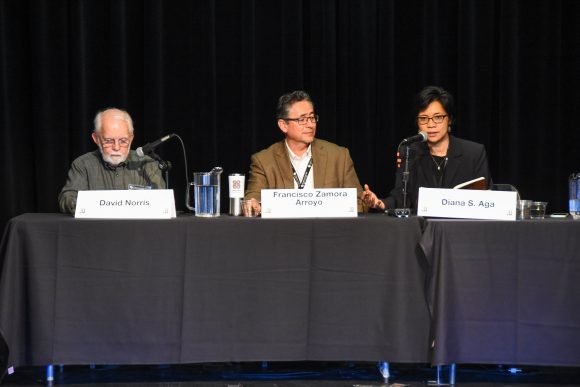
Panelists discussed the presence of antidepressants and other medications in water systems. April 12, 2018 (Fiona Matson/CU Independent)
Managing environmental crises and concerns was a hot topic during the Conference on World Affairs, with panelists working through a multitude of problems and how to manage them.
The Conference on World Affairs, held from April 9 to 14, created a platform for experts in various fields to discuss and inform fellow speakers and the audience. In the environment category it did just that, presenting new statistics and studies at each panel. Using colorful titles such as “Even the Fish are Depressed,” the panels both informed and entertained. There were questions about specifics dealing with methane leak procedures at natural gas facilities, how to reduce carbon footprints, the effect of fish-eating pharmaceuticals effects and much more.
Each panel possessed experts in many different fields dealing with the environment. From astrobiologist David Grinspoon to political and environmental author Steven Hayward, the viewpoints were varied and informed. Though the panelists had different areas of expertise, they matched each other in terms of knowledge.
Susan Shaw, an internationally recognized marine toxicologist and the founder and director of the Marine & Environmental Research Institute spoke during the panel “Fossil Fuels are Bor[e]ing.” She said she was very impressed by the diversity of panelists during CWA.
“It’s very energizing to hear other people who have a totally different background, a different knowledge base, sharing with each other,” Shaw said. “It’s a wonderful conference.”
During the panel Shaw spoke at there was a toxicologist, an energy analyst, a public policy research professor and a representative from the Colorado Oil & Gas Association. This brought many interesting views into the discussion on fossil fuels and their negative effects.
In Boulder environment is always a hot topic, exemplified by the large turnout at each of the environmental panels. Mary Beth Downing, a local environmentalist, comes whenever she can and has attended the conference since she was a student 38 years ago.
“The food for thought [brings me back],” Downing said. “Stuff I hadn’t thought about, a new way to think about things and the caliber of speakers is incredible.”
A range of 25 to 150 people populated each event. Not all attendees were locals. Mike Ballard and Roy and Nancy Worthington flew all the way from Kansas City to attend. They have been coming since they were students in the late sixties.
“It’s always so interesting,” Ballard said.
The CWA allows audience voices to be heard, with each panel divided into two parts. The first half is the speakers presenting their work and the second is audience questions. The audience was often fairly informed on the topics as well, asking questions that would really get the speakers thinking.
Community members and visitors weren’t the only ones who were fans of CWA. Tracy Holloway, environmental studies professor at the University of Wisconsin, had nothing but positive things to say about the environmental panels.
“I’ve never heard of this kind of event happening at any university in the world and it’s really exciting to be part of it here at Colorado,” Holloway said.
Contact CU Independent News Staff Writer Hank Graham at hank.graham@colorado.edu.
